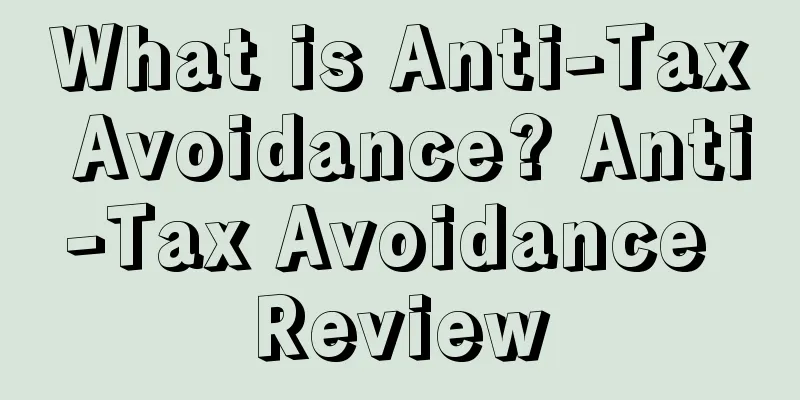What is Anti-Tax Avoidance? Anti-Tax Avoidance Review

|
Anti -tax avoidance refers to the active measures taken by the country to prevent and stop international tax avoidance. Anti-tax avoidance definition Anti-tax avoidance is a management activity against tax avoidance. Its main contents include financial management, tax inspection, audit and invoice management in a broad sense, and plugging tax law loopholes by strengthening tax investigation in a narrow sense. (1) Tax avoidance is generally considered to be the act of taxpayers, based on their familiarity with relevant tax laws and regulations and without directly violating tax laws, taking advantage of the differences, loopholes and ambiguities in tax laws and related laws to circumvent or reduce tax burdens through careful arrangements of tax-related matters such as business activities, financing activities and investment activities. It has the following characteristics: it is fundamentally different from tax evasion and is legal or not illegal; its purpose is to minimize the tax burden through tax exemption, under-taxation and delayed taxation; it takes advantage of the imperfections or loopholes in tax laws and can only be implemented through careful planning and arrangements. (2) Anti-tax avoidance refers to the measures taken by the government to resist tax avoidance in order to make taxpayers' tax-related behavior comply with the government's tax legislation intent and to collect taxes in a timely and full manner in accordance with the law. Anti-tax avoidance management The management of tax avoidance should draw on the experience and practices of developed countries and adopt corresponding management measures, especially making relevant laws more authoritative and practical. 1. Tax design should be scientific Its purpose is to pursue "vertical moderation" and "horizontal fairness" of tax burden. "Vertical moderation" means that tax collectors should take tax in moderation, give full play to the role of tax in promoting production, and ease tax avoidance. "Horizontal fairness" requires that we should pay attention to the uniformity of taxation and differentiated treatment, strengthen tax regulation, and level the starting line of competition. Uniformity and differentiation complement each other and are indispensable. Uniformity means that the same tax should be paid in the same situation, reflecting "everyone is equal before taxation". Differentiation means that taxpayers at the same starting line should bear more responsibilities and obligations due to their superior objective factors. Horizontal fairness can also ease tax avoidance. 2. Strict tax legislation and management Its purpose is to plug loopholes. Clear taxpayers, detailed and scientific tax objects and tax items, and rigid and unified tax rates are the basis for anti-tax avoidance. On the contrary, improper tax payment links, excessively high tax rates, and complex and inconvenient collection methods may induce tax avoidance. 3. Improvement of the quality of tax personnel Tax avoidance and anti-tax avoidance in taxation are actually a battle of wits and courage between tax collectors and taxpayers. Due to the difference in interests between tax collectors and taxpayers in tax avoidance and anti-tax avoidance, it is extremely necessary to strengthen the management of the tax collection and management team. For taxpayers, the benefits of successful tax avoidance directly belong to individuals, which is the most tempting when the punishment is not severe; while for tax collectors, successful anti-tax avoidance does not directly affect the distribution of benefits after tax collection and management, or even has no benefits, which leads to active tax avoidance and passive anti-tax avoidance. Therefore, it is imperative to solve the motivation mechanism and pressure mechanism of tax collectors in anti-tax avoidance so that they can actively engage in anti-tax avoidance activities. 4. Clean up and adjust tax incentives The implementation of tax incentives can harm the tax base in two ways: on the one hand, the incentives themselves narrow the tax base or reduce the tax rate; on the other hand, a large number of taxpayers who should not have enjoyed this incentive evaded taxes through "hanging" activities. The former is voluntarily abandoned by the tax authorities, while the latter is derived and unexpected by the tax authorities. If it is allowed to develop, my country will evolve into a huge tax haven. Therefore, it is urgent to clean up and adjust tax incentives. Immediately close the tax incentive gate, and no reason should be used as a basis for the introduction of new tax incentives; the decision-making power of tax incentives must be returned to the central government to prevent illegal exemptions, exemptions beyond authority, and exemptions beyond the level. The relevant departments of governments at all levels have no right to establish tax incentives. Once it occurs, it should be regarded as an illegal act; unify the tax incentive methods, change the preferential treatment based on corporate and personal identities to unified preferential treatment based on regions, industries, and products, and make the tax burden fair and standardized. 5. Give full play to the role of certified public accountants According to international practice, when auditing corporate finances, certified public accountants usually require companies to have reasonable profits, and for this reason they pay more attention to the adjustment of transfer pricing. Because in their minds, if they turn a blind eye to excessive transfer pricing of their clients and do not make adjustments, it will be difficult to pass the tax department's review, and they will also risk losing the trust of the tax authorities, which will have a great impact on future work. However, my country's certified public accountants basically ignore their clients' transfer pricing. If accounting firms and their certified public accountants can intervene in this field, then some transfer pricing may be adjusted during the accounting audit stage, eliminating tax avoidance in its infancy. 6. Legal provisions for transfer pricing accounting adjustments after tax adjustments According to the current tax laws and regulations and accounting system in my country, the "accounting income" and "taxable income" of enterprises are basically consistent. Therefore, after making tax adjustments to transfer pricing, if the enterprise accounts are not adjusted, the "accounting income" and "taxable income" will inevitably be inconsistent. Although the loss of the enterprise has been reduced or increased after the tax adjustment, the loss will remain the same as before because the accounting accounts are not adjusted, and the loss will be carried forward in the next year. Over time, it is possible that the anti-tax avoidance results of my country will not be guaranteed by accounting. Therefore, after making tax adjustments to transfer pricing, it is necessary and feasible for the enterprise accounts to be adjusted. This is particularly important under the conditions of the standardization of my country's tax system and the standardization and internationalization of the accounting system. Strengthening measures to combat tax avoidance The existence of tax avoidance, especially the expansion of illegal tax avoidance, will inevitably bring certain negative impacts on social and economic life, undermine equal competition among taxpayers, and hinder the normal functioning of the market mechanism. Therefore, it is particularly important to strengthen anti-tax avoidance work. Specifically, strengthening anti-tax avoidance work should start from the following aspects: (I) Establish a complete tax system and continuously improve the tax collection and management system. First, strengthen the law enforcement power of tax authorities. Tax authorities should strictly review taxpayers' tax behaviors and severely punish tax evasion. Only in this way can we ensure the implementation of various tax policies and prevent tax evasion and tax avoidance. Second, strengthen the construction of tax cadres, improve the political and professional qualities of special managers, strengthen anti-tax avoidance awareness, and make them have a deep understanding of various forms of tax avoidance, so as to strictly control the collection and management and ensure that the tax lever reasonably regulates economic behavior. (II) Increase the intensity of tax avoidance penalties. In the face of crazy international tax avoidance, most countries in the world have adopted heavy penalties. For example, the United States has adopted such a large penalty that tax avoidance companies are daunted. At present, my country's tax authorities only make tax adjustments for tax avoidance behaviors they discover, and rarely impose fines, which makes tax avoidance companies feel lucky. Therefore, my country should strengthen the punitive regulations for tax avoidance and increase the intensity of tax avoidance penalties. (III) Make full use of the Internet to strengthen tax information exchange and cooperation and improve the quality of transfer pricing investigations. Information is an important prerequisite for tax authorities to accurately judge and adjust the transfer pricing of related enterprises. Ineffective information is one of the important reasons for the loss of control of tax evasion and tax revenue of foreign-invested enterprises in my country. Therefore, it is necessary to establish and improve my country's tax information network as soon as possible, and to establish a database connection system with customs, banks, industry and commerce, foreign trade and economic cooperation, statistics, prices and other departments as soon as possible, so as to form a broad public data network to thoroughly solve the problems of blocked information channels and ineffective sharing. At the same time, it is also necessary to actively carry out international and domestic tax information exchanges and cooperation to change the situation in which my country knows nothing about the international prices of products. In addition, it is also necessary to make full use of network tax resources to collect, investigate and analyze comparable information and improve the quality of transfer pricing investigations. (IV) Fight against tax avoidance by strengthening tax collection and management. A scientific and strict tax collection and management system is a strong guarantee for plugging tax loopholes and preventing tax avoidance. Therefore, the tax supervision and inspection mechanism should be strengthened, the role of supervision and inspection should be fully utilized, and taxation should be governed by law. Specifically: First, a tax declaration system should be generally implemented to understand the business activities and property status of taxpayers. Second, investigation and auditing should be strengthened, and tax personnel who are familiar with tax policies and corporate financial knowledge and have certain work experience should be assigned to analyze and audit the prices, sales revenue, labor income, profits and losses of the goods purchased and sold by the enterprise. If it is determined that the enterprise has engaged in tax avoidance, tax adjustments should be made. Third, a tax collection method with taxpayers actively declaring taxes as the main form and various forms should be implemented. In addition, computers should be widely used to review taxpayers' declaration materials, and taxpayers' declaration forms should be compared with other information materials to verify the accuracy and rationality of the declaration materials. International anti-tax avoidance measures The existence of international tax avoidance has had a significant impact on international economic exchanges, the financial interests of relevant countries, and the psychology of taxpayers. Therefore, relevant countries have taken corresponding measures to restrict the various methods used by multinational taxpayers to avoid international taxes. International anti-tax avoidance measures mainly include the following aspects: 1. General measures to prevent international tax avoidance through international transfer of taxpayers: (1) For natural persons who evade tax by relocating abroad, some countries stipulate that only "real" and "complete" relocation can be recognized, and only then can the tax collection relationship with the country be separated, while "partial" and "false" relocation will not be recognized. For example, Germany stipulates that if a natural person who pays taxes has lost his or her resident status in the country but still has economic ties, the relevant income tax should be levied on him or her continuously and he or she will be regarded as a special "non-resident"; (2) Some countries allow legal persons to evade tax burdens by changing their residence or citizenship. The Netherlands once stipulated that domestic enterprises were allowed to relocate to Dutch territories during wartime or other similar disasters without tax evasion. However, relocation for other reasons was generally considered to be for the purpose of tax evasion and was not recognized, and the enterprises continued to bear tax obligations. 2. General measures to prevent international tax avoidance through international transfer of taxable objects: The financial revenue and expenditure activities and profit distribution forms between internationally affiliated enterprises reflect the characteristics of "group interests". The key to restricting such tax avoidance activities is to adhere to the "independent competition" standard, that is, to examine and measure whether the profits of a company are normal and whether unreasonable arrangements have occurred between companies according to the costs, expenses or profits that should be borne or attributed to any party of the affiliated companies and unrelated third-party companies, each of which appears as an independent economic interest and a competitive identity, and engages in the same or similar activities under the same or similar circumstances. Anything that meets the "independent competition" standard can be recognized when taxing, otherwise, it must be adjusted according to this standard, so that the purpose of preventing tax avoidance can be achieved. 3. Transfer pricing adjustment: The pricing of goods or property sold between related enterprises has always been a focus of preventing international tax avoidance. The key link is to determine a fair price, which is used as a measure to determine whether taxpayers use transfer pricing to lower or raise prices and evade taxes. The United States stipulates in the Internal Revenue Code that when related enterprises or companies sell goods or property to each other, the fair price stipulated by fiscal regulations is the price paid by unrelated parties under the same circumstances to sell similar goods or property. There are three main methods for adjusting transfer pricing: a. Comparable uncontrolled price method, which is to determine the transfer pricing by comparing the price sold to unrelated buyers without any human control factors; b. Resale price method. If there is no comparable price, the transfer pricing is determined by deducting a reasonable difference between the purchase price and the sale price when the buyer of the related enterprise transaction resells the purchased goods to a third party with no related enterprise relationship; c. Cost plus profit method. If there is no comparable price and the purchased goods have a certain added value after processing, the price is composed of the manufacturing cost plus a reasonable gross profit according to the formal accounting method; d. Comparable profit method, which is to compare the book profit of the related enterprise with the actual profit of a non-related enterprise with similar operating activities, or to compare the book profit of the related enterprise with its historical profit in the same period, to obtain a reasonable profit range and adjust the price accordingly. 4. Measures to prevent tax avoidance by using tax havens: In response to the special tax incentives of international tax havens, some countries have made corresponding provisions in their own tax laws to prevent international tax avoidance from happening, starting from safeguarding their own tax rights and interests. Among them, the preventive measures of the United States are the most complex and typical. The U.S. Internal Revenue Code stipulates that as long as more than 50% of the total "comprehensive voting rights" shares of a foreign company belong to some U.S. shareholders, and each of these shareholders holds more than 10% of the comprehensive voting rights shares, the company will be regarded as a foreign company controlled by U.S. taxpayers, that is, a foreign base company. Moreover, as long as this equity standard occurs on any day in a tax year, a foreign company will be regarded as a foreign base company in that year. Under the above conditions, all income that should be attributed to each U.S. shareholder according to the dividend ratio, even if the foreign base company has not distributed it in that year, should be included in the income of each U.S. shareholder in that year for tax calculation. This part of income is called foreign base company income, and the total foreign tax payable can be credited. When this part of income is actually distributed to U.S. shareholders as dividends in the future, it will no longer be taxed. 5. Strengthening tax collection management: In recent decades, many countries have strengthened tax collection management from the following aspects and formulated relatively strict tax management systems. (1) The tax declaration system strictly requires all taxpayers engaged in cross-border economic activities to declare all their operating income, profits, costs or expenses to the national tax authorities in a timely, accurate and truthful manner. (2) The accounting and auditing system is closely related to the tax declaration system. It is about how to conduct necessary audits on the accounting process and results of multinational taxpayers to check whether their business or accounts are untrue, improper, or contain excessive costs and fictitious expenses. (3) Income determination system: Many countries use assumptions or estimates to determine the taxable income of international taxpayers. Taxation can be based on an assumption or estimate. This is not a violation of the tax law, but an effective method adopted in some special circumstances. For example, when the taxpayer cannot provide accurate cost or expense vouchers and cannot correctly calculate the taxable income, the tax authorities can refer to certain standards, estimate or determine a corresponding income, and then levy taxes based on it. References |
<<: What is tax jurisdiction? Tax jurisdiction assessment
Recommend
Amazon hits copyright hooligans hard? The official did a great thing!
Yesterday, Amazon announced that it had recently t...
What is Categories Requiring Approval? Categories Requiring Approval Review
Categories Requiring Approval is a policy official...
Amazon is about to restrict this feature...
In the coming February, in addition to the people...
The recalled products are still on sale, and this platform has been warned by the US CPSC
It was learned that on April 13, according to fore...
What is ChannelAdvisor? ChannelAdvisor Review
ChannelAdvisor is a leading e-commerce cloud platf...
Exclusive interview with the French Ministry of Environmental Protection: Sellers who fail to comply with the EPR in January 2022 should be shut down
This article has a total of 6248 words and takes 7...
How do mature Amazon sellers review their operations?
The operational rhythm is to do the right thing a...
What is the International Shopping Feature? International Shopping Feature Review
The International Shopping Feature is a feature la...
Share the pitfalls I encountered when selecting products on Amazon
Image source: Tuchong Creative Let me briefly tal...
Sellers’ Voices丨Amazon Entrepreneurship Records after the Epidemic
Back to the topic, today's seller story submis...
Big news! Amazon’s high return rate label policy is really here!
It is learned that recently, according to sellers,...
Switching to Tik Tok! Top domestic influencers flock to overseas markets
According to the latest data from dataai, in 2023,...
What is Giteki? Giteki Review
Japan's Radio Law clearly stipulates that all ...
More than 60 injuries were caused! Nearly 180,000 products were recalled!
<span data-shimo-docs="[[20,"获悉,据外媒报道,近日美国...









